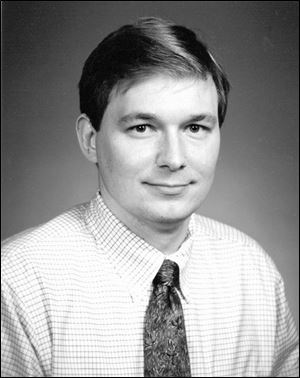
Infertile couples to get another option MCO
1/3/2003
Dr. Joe Karnitis says patients requested the option.
Medical College of Ohio and Toledo Hospital each intend to begin offering infertile couples the option of receiving eggs from anonymous donors sometime this year.
MCO will pay donors $2,500. Toledo Hospital hasn't decided how much to reimburse donors, although it expects to offer between $1,500 and $3,000.
Donors must be healthy and have no chronic diseases such as diabetes or high blood pressure. MCO will seek women ages 19 to 32, while Toledo Hospital most likely will seek women ages 25 to 37. Sperm from the recipient's husband will be used to fertilize the eggs.
Both organizations already transplant eggs from known donors - such as from a sister or friend of the recipient - but some women don't have someone willing to donate eggs, or are uncomfortable approaching friends or relatives. As a result, both MCO and Toledo Hospital officials said they've been getting requests to start anonymous donor programs. MCO said it has 10 couples waiting for donations.
“We were kind of pushed into doing this by our patients who said they didn't want to travel to Chicago,” said Dr. Joe Karnitis, director of the Fertility Center of Northwest Ohio, which is based in Toledo Hospital.
Once they're up and running, The Fertility Center at MCO and Toledo Hospital's Fertility Center of Northwest Ohio will be the only two locally based programs offering anonymous egg donation. The Toledo Fertility Center - through its parent company, IVF Michigan - offers anonymous egg donation at a site in Rochester Hills, Mich. Most of IVF's donated eggs come from Michigan university students, while MCO and Toledo Hospital will concentrate mostly on local donors.
Insurance doesn't cover egg donation costs, and couples usually spend $10,000 to $15,000 at MCO and Toledo Hospital to pay for the procedure. Neither organization expects to make much money off of anonymous egg donations. MCO expects to perform about seven to 10 such procedures annually; Toledo Hospital, about three or four.
In fact, transplanting eggs is a small part of each organization's overall business. Most fertility problems are treated with drugs or other methods.
“We're able to fix most problems without resorting to the big guns,” Dr. Karnitis said of invitro fertilization - the process of fertilizing an egg outside the body, then transplanting the resulting embryo into the woman.
Dr. Lynda Wolf, director of MCO's Fertility Center, said she served as director of an anonymous egg donor program at the University of North Carolina. In her experience, she said, most donors do it to help, not for the money.
“The young women who donated their eggs were just wonderful,” she said. “Some were mothers who said, `I have my family and I'd love to help another family achieve the joy I have,' and a lot were young women at the university who really cared more about helping other women.”
Dr. Wolf said being able to offer couples another option for having a baby is a thrill for her.
“When you get blessed to make that call and tell a couple they're going to have a baby, there's nothing more wonderful than that,” she said.
That said, couples are told that egg transplantation isn't a sure thing. MCO has had about a 60 percent success rate per try. Dr. Karnitis said Toledo Hospital has had about a 50 percent success rate.
During each outpatient egg donation procedure, Dr. Wolf said doctors try to withdraw 10 to 15 eggs and obtain eight to ten embryos after fertilization. Under normal conditions, women release up to 20 eggs a month but only one becomes mature. During her reproductive life, a woman produces about 400,000 eggs, so donating eggs has little effect on her total supply.
Two to three embryos are transplanted in each attempt. Multiple births do occur, but aren't common. In addition, several other embryos are kept frozen for future use.
The additional embryos produced are either used again, donated to another couple, donated to science [this type of research is not done in Toledo], or discarded.
As with donated sperm, recipients of donated eggs will get a brief description of the donor, including height, hair color, education level, hobbies, occupation, and other details. The identities of the donors, however, remain anonymous.